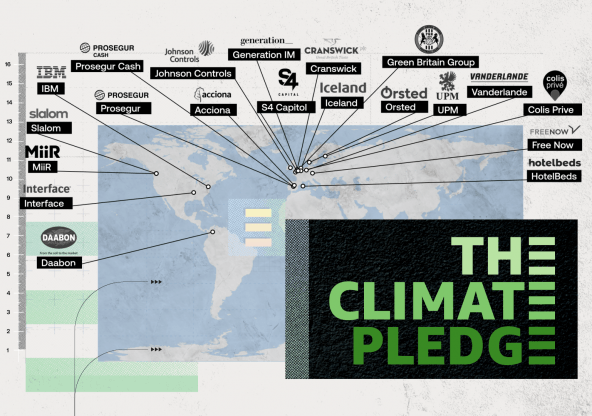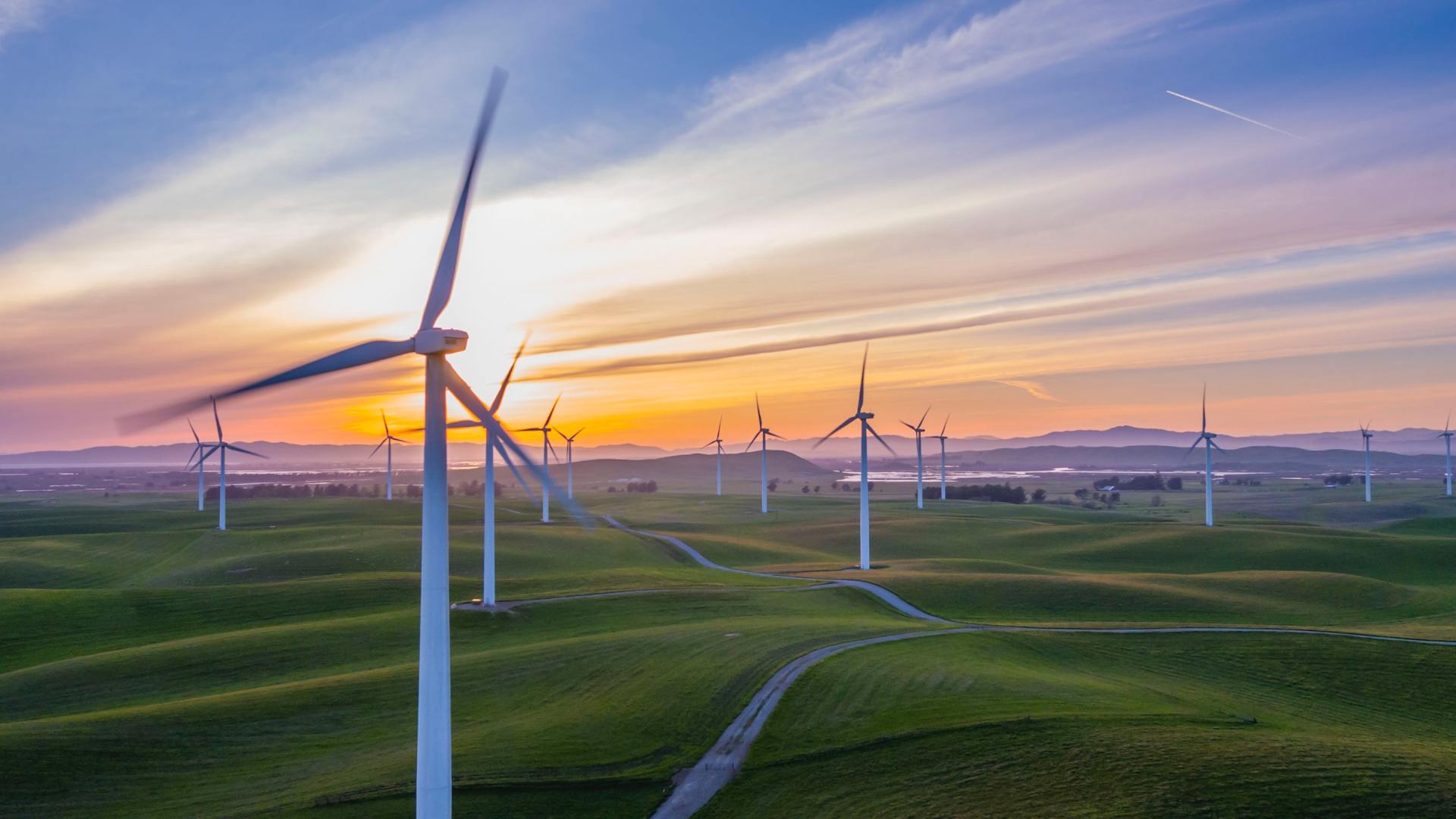Blog Layout
Iceland joins Amazon and the Climate Pledge commitment to become net zero carbon by 2040
Iceland | 17 February 2021
Industry Insights / Iceland joins Amazon and the Climate Pledge commitment to become net zero carbon by 2040
Iceland has become the first food retailer internationally to join the Climate Pledge, a commitment to be net-zero carbon by 2040 – a decade ahead of the Paris Agreement’s goal of 2050.

Signatories to the pledge agree to measure and report on greenhouse gas emissions; put in place decarbonisation strategies in line with the Paris agreement; and neutralise any remaining emissions with additional, socially beneficial offsets to achieve net zero annual carbon emissions.
Iceland is one of 20 new signatories to the pledge, that represent diverse economic sectors, ranging from energy to agricultural and financial services. Each company is implementing science-based, high-impact changes to its business to help decarbonise the value chain, including innovating in circular economy, deploying clean energy solutions, and mobilising supply chains to reach net-zero.
Jeff Bezos, Amazon founder and CEO said “Amazon co-founded The Climate Pledge in 2019 to encourage companies to reach the goals of the Paris Agreement 10 years early, and we’re seeing incredible momentum behind the pledge with 53 companies from 18 industries across 12 countries already joining. Together, we can use our collective scale to help decarbonize the economy and preserve Earth for future generations.”
Richard Walker, Iceland Managing Director said “We believe that every business has a moral responsibility to take ambitious action to address these major and urgent sustainability issues; it is also a commercial imperative for any business that hopes to have a future. We are delighted to be the first food retailer to join The Climate Pledge and commit to be net-zero carbon by 2040.”
Find out more about the Climate Pledge at https://www.theclimatepledge.com/

by Rachael McMahon
•
30 March 2021
Living Sustainably- The Facts In 2019, the Intergovernmental Panel on Climate Change (IPCC) , reported how a temperature rise of 1.5 degrees Celsius will negatively impact the world. Supporting the beef industry contributes to climate change ; the production of meat, dairy, and immense water usage to grow food for the animals are all factors that lead to a high carbon footprint. Making improvements on food production, transforming eating habits and reducing food waste can help fight climate change. These adjustments need to come from governments and societies soon, as the impacts on the planet will soon be irreversible. The pandemic and time in lockdown have caused many to rethink their relationship with food. Restrictions of movement and fear caused food security worries and fuelled a new passion for home cooking. Lockdown has even influenced people to increase their vegetable consumption. The Next Generation’s Priorities In order to understand the impacts of the pandemic, Strategy& PwC surveyed a total of 2,000 adults about their ever-changing eating habits and shopping behaviours. About 15% (one in six shoppers) stated that health was the most important driver for their diet change, followed by ethics, sustainability, and animals. 22% of Generation Z and Millennials (18–34 years) were more likely to change their habits for environmental and ethical reasons, in comparison to only 10% of participants aged 55 and over. As younger generations are changing their habits, the retail industry needs to adapt to new consumer and environmental demands. Carbon Emissions Reduction The social economic disruption, lockdowns, and work from home situations have led to global greenhouse gas emission reduction of nearly 2.4 billion , a 7% drop from 2019. While these emissions are predicted to rebound in 2021, governments are encouraged to prioritise policies that tackle climate change in their upcoming economic recovery plans. More adults grew conscious about the environment in lockdown, as seen in a study commissioned by the global hygiene and health company, Essity . During lockdown, 81% of adults stated that they worried more about the planet’s future. A further 50% of these adults have converted these concerns into actions by buying less plastic, recycling more often, and taking shorter showers. Going Vegan and Buying Sustainable Products The Veganuary concept started in 2014 in York, encouraging people to follow a vegan lifestyle for the month of January. The number of participants has doubled since 2019; 500,000 people signed up to participate in Veganuary this year, with 125,000 participants from the UK . Iceland was one of the British supermarkets to participate in this challenge, promoting the many benefits of a plant-based diet. Awareness surrounding health and ethics has increased during the COVID-19 crisis, as restrictions do not allow people to travel long distances to shop. People have realised the importance of health, exercise and well-being. A survey of 3,000 shoppers conducted in April 2020 found that 64% of consumers focused more on limiting food waste. Half of the consumers surveyed said they were opting for healthier options, with another 45% stating that they are conscious about purchasing items that are more sustainable. Iceland are Doing IT Right Sustainability has become a major driver in consumers’ decision-making processes. Supermarkets and brands have recognised the acceleration of environmental awareness and are working to meet their consumers’ needs and expectations. The Doing it Right campaign is at the heart of sustainability. Iceland supports the UN’s Sustainable Development Goals (SDG), following the five principles: • Caring for the planet by enhancing the global environment through leading initiatives • Supporting the communities by paying taxes and through their Charitable Foundation • Selling quality food at a great value • Working with suppliers to build mutually beneficial long-term partnerships • Valuing our people as family business Iceland’s focus is to wipe out poverty, fight inequality and tackle climate change in the run-up to 2030. Iceland’s own label products have not contained palm oil since 2019. They have reduced their plastic packaging and plans to remove plastic packaging from their own label completely by 2023. Adding to all Iceland’s commitment of being more sustainable, Managing Director Richard Walker has written a book on how to help other businesses become more sustainable. The book ‘The Green Grocer: one man’s manifesto for corporate activism’, discusses how it is possible to be successful in sustainable initiatives while being pragmatic about profit and staying committed to customers and employees. The Iceland Media team provides Iceland Suppliers with a full range of media opportunities that influence Iceland customers, and help brands grow by drawing attention to their environmental and socially responsible products and brand values. Interested in booking a campaign in Iceland stores or online? Request a proposal or send an email to hello@icelandmedia.co.uk .

by Iceland
•
21 March 2021
Richard Walker, Managing Director of Iceland Foods will share his unique approach to leading a sustainable business agenda in a new book, which will be published in April. The Green Grocer sets out Richard’s learnings since he embarked on Iceland’s ‘Doing it Right’ plan in 2017 and his practical advice for business of all sizes that want to make a positive difference.
Powerful media inventory to amplify your existing JBPs...
Create a campaign brief and we'll respond within 24 hours with a recommendation & commercial proposal...
CONTACT US
Iceland Supplier Optimisation Team
(provided by rmi)
7 Bell Yard
Strand
London
WC2A 2JR
(provided by rmi)
7 Bell Yard
Strand
London
WC2A 2JR
020 8962 2300
hello@IcelandMedia.co.uk
USEFUL LINKS
STAY INFORMED
Subscribe
Thank you for contacting us.
We will get back to you as soon as possible
We will get back to you as soon as possible
Oops, there was an error sending your message.
Please try again later
Please try again later

